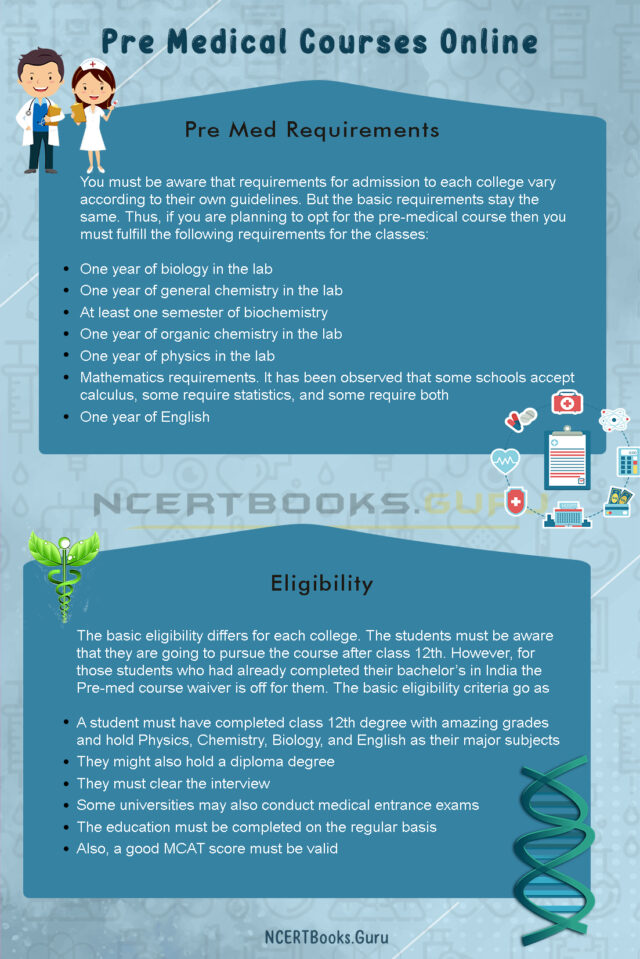The journey towards becoming a Medical Bachelor of Surgery (MBBS) is often marked by rigorous preparation and dedication. The foundation for this journey is laid through pre-medical courses, which are designed to equip aspiring medical students with the essential knowledge and skills required for medical school. These courses are crucial for developing a strong understanding of the fundamental principles of medicine and for preparing for the challenges of medical education.
The Role of Pre-Medical Courses
Pre-medical courses are structured to provide students with a comprehensive background in the sciences, particularly in subjects such as biology, chemistry, and physics. These subjects are deemed critical as they form the basis of medical knowledge that will be built upon in medical school. In addition to the sciences, courses in mathematics and statistics are often included, as they are necessary for data analysis and interpretation in medical research and practice.
The curriculum of pre-medical courses is designed to foster a deep understanding of human anatomy, physiology, and biochemistry. Emphasis is placed on developing analytical and critical thinking skills, which are essential for problem-solving in medical scenarios. Students are exposed to a variety of scientific concepts and are encouraged to apply these concepts through practical experiments and laboratory work.
Importance of Science Courses
Biology is one of the cornerstones of pre-medical education. The intricate details of cellular processes, genetics, and human physiology are studied to prepare students for the complexities of medical science. Chemistry, including both organic and inorganic chemistry, is also fundamental. Understanding chemical reactions and molecular structures is crucial for grasping the biochemical processes that underlie medical conditions and treatments.
Physics courses are included to provide insight into the principles of mechanics, electromagnetism, and thermodynamics, which are relevant to various medical technologies and diagnostic tools. Mathematics courses, particularly those focused on calculus and statistics, are essential for understanding quantitative data and for conducting research in medical fields.
The Role of Behavioral and Social Sciences
In addition to the natural sciences, pre-medical courses often incorporate elements of behavioral and social sciences. These courses are designed to develop an understanding of psychological and sociological factors that influence health and illness. Subjects such as psychology, sociology, and ethics are included to help students grasp the human aspects of medicine, which are crucial for providing holistic patient care.
Behavioral sciences contribute to the development of communication skills and empathy, which are vital for effective patient interactions. Ethical considerations and the impact of social factors on health are also emphasized, preparing students to address the broader context of medical practice.
The Impact of Clinical Exposure
While pre-medical courses primarily focus on theoretical knowledge, some programs include opportunities for clinical exposure. Shadowing programs and internships in healthcare settings allow students to observe medical professionals in action and gain firsthand experience of patient care. This exposure is valuable for understanding the practical aspects of medicine and for confirming one’s commitment to a medical career.
Clinical exposure also helps students develop practical skills, such as patient communication and clinical reasoning. These experiences provide insights into the day-to-day realities of medical practice and contribute to a more informed and realistic perspective of the medical profession.
Preparing for Medical School
Successful completion of pre-medical courses is a significant step towards entering medical school. These courses are designed to ensure that students are well-prepared for the rigorous curriculum of medical education. The knowledge and skills acquired during this preparatory phase are built upon in medical school, where more advanced concepts and clinical practices are introduced.
Pre-medical courses also play a role in the admissions process for medical schools. A strong academic record in these courses is often required for acceptance into medical programs. In addition, standardized tests such as the Medical College Admission Test (MCAT) are used to assess students’ understanding of the material covered in pre-medical courses.
Challenges and Strategies
The path through pre-medical courses is not without challenges. The workload can be demanding, and the material can be complex and challenging. However, effective study strategies and time management skills can help students navigate these challenges successfully.
Regular review sessions, practice exams, and study groups are commonly used strategies for mastering the material. Additionally, seeking support from instructors and academic advisors can provide valuable guidance and resources. Balancing academic responsibilities with self-care and personal well-being is also crucial for maintaining overall health and performance.
Conclusion
Pre-medical courses play an essential role in preparing students for their MBBS journey. By providing a solid foundation in the sciences and introducing key concepts in behavioral and social sciences, these courses equip students with the knowledge and skills necessary for success in medical school. The challenges faced during this preparatory phase are integral to the development of competencies required for a career in medicine. As students advance through their pre-medical studies, they lay the groundwork for a rewarding and impactful medical career.










